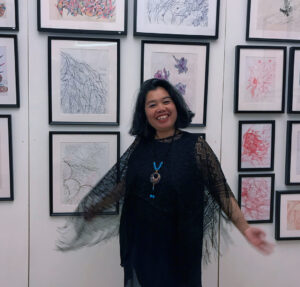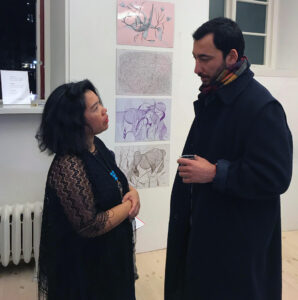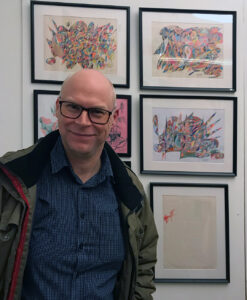MarJoJe
In the book “Inre rum” [Inner rooms] (2011), MarJoJe explains how she received a call in 2006 from God the Father, the Holy Ghost, Jesus, and the Virgin Mary. The call was all about contributing to the world’s salvation through automatic writing that becomes spiritual art. When she draws, she experiences a feeling of perfection and can continue and continue to create. In November 2019, MarJoJe and Mad Heritage arranged the exhibition “The golden art of the lost mankind in paradise” at the Aniara bookstore where a selection of her works were exhibited.



MarJoJe comes from the Philippines. There, she is established with her own missionary work with the group Sagrada Famiglia who teach contact with God, automatic writing, preaching and healing. She lives in Sweden for periods. In 2006, she was admitted to Lillhagens Hospital, a now-closed mental hospital.
How can the same person be seen, and have her life shaped, in such different ways, depending on where in the world she is? Sweden belongs to a cultural realm characterised by medical and individual descriptive models used to understand people’s experiences and actions. Conditions that in other parts of the world are seen as a natural part of life are seen as medical abnormalities and as indications that there is something wrong with the person in question. In all times and cultures there have been people who perceive themselves to have been called by some higher beings. Martin Berntson, professor of religious studies and theology at the University of Gothenburg, explains: “It is very tempting to associate these types of higher callings and divine inspiration in our secular society with something irrational and entirely governed by emotions. But there are numerous examples of groups and individuals in the West that have historically and even in our own time have seen themselves as divinely inspired while also acting fully rationally in their literary and artistic expressions. Perhaps it is rather that secular society has abandoned the broader interpretative framework referred to by artists like MarJoJe. When it comes to art, for example, Orthodox religious icons are usually painted in a “spiritual state”, often in prayer, while the painting technique itself is very advanced and formalised and requires extensive training. Another example is our Swedish saint, Birgitta, who received revelations in an ecstatic state and thought that she had received revelations from Christ and his mother, but that did not prevent the revelations in many cases being inspired by other writers she read and probably had in front of her.”
It is possible to wonder why traditional Western models of explanation are so often given precedence over interpretation. Psychiatric diagnoses are social constructs, created in a western context. It is often said that mental health is a question of global justice, that mental healthcare needs to develop in middle and low-income countries. But then we have to ask ourselves who can define what mental health is, how people should be seen and treated, and whether Western approaches are, by definition, more humane, reasonable or successful. Researchers such as China Mills, Dainius Puras and Pat Bracken say that the established, medicalised western view of mental health and the human condition and expression needs to be changed, even decolonised. Otherwise, human differences, cultural expressions, and experiences of war, poverty and oppression will be medicalised.
We also need to take into account that experiences that may seem strange or frightening to outsiders need not be frightening to the people themselves. Sometimes these experiences can be considered enriching, as in the case of MarJoJe.
MarJoJe’s art is outstanding. She lives a rich life with many relationships and social contacts, travelling between the Philippines and Sweden and organising an exhibition opening together with the Mad Heritage Association. The doctor that MarJoJe met at Lillhagens Hospital wrote psychosis in his records. She, herself, feels elated and free.
The exhibition “The golden art of the lost mankind in paradise” 2019
Text and pictures by Elisabeth Punzi
